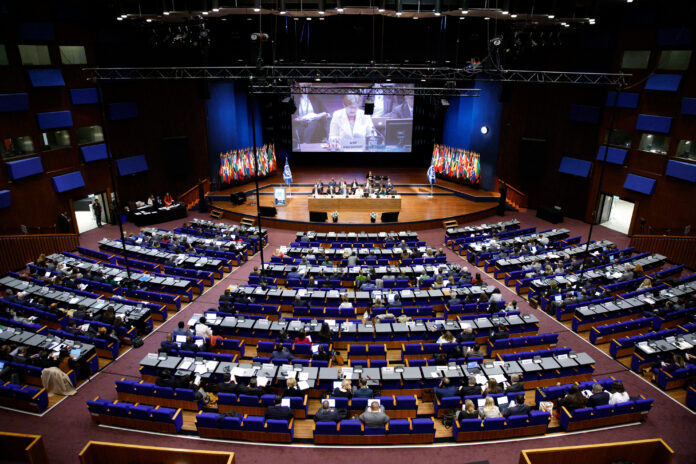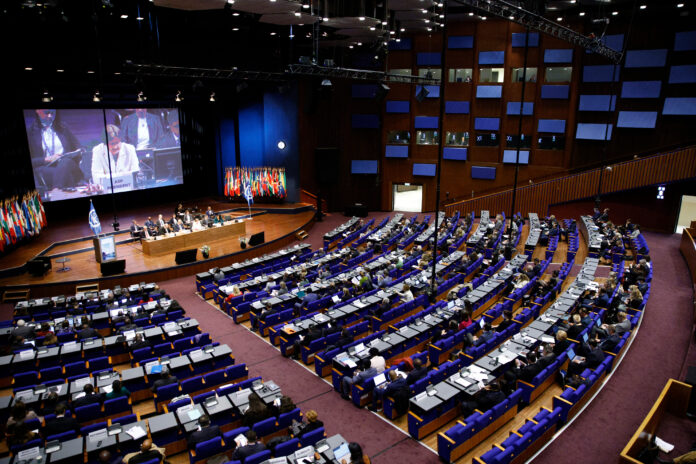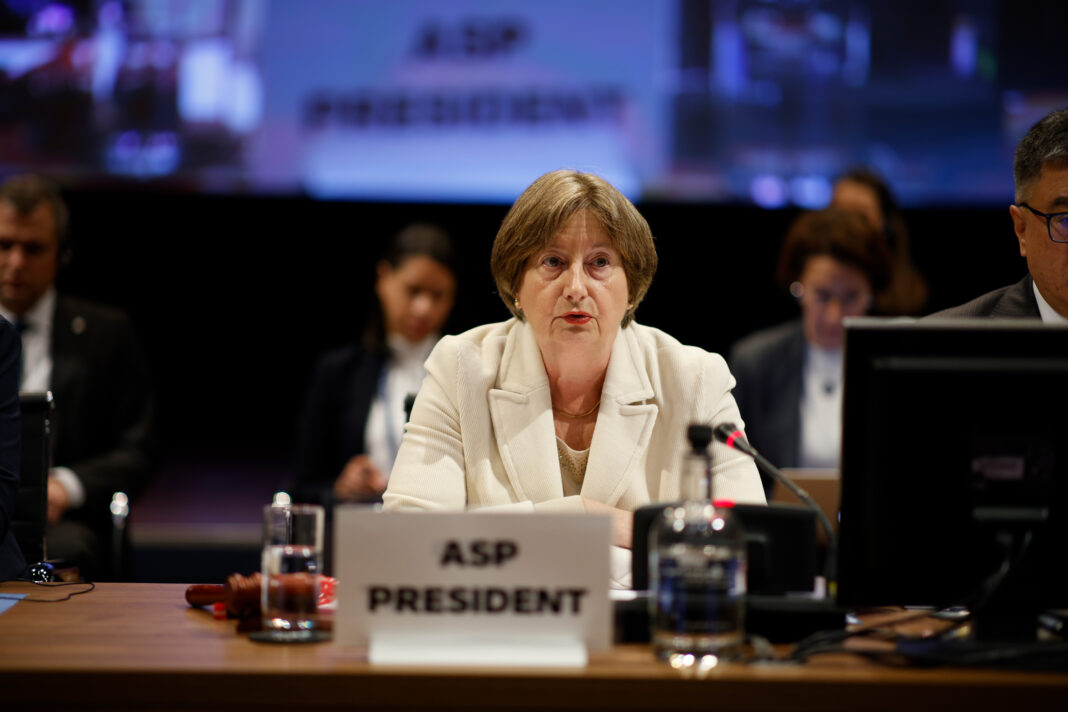This year marks the twenty-fifth anniversary of the adoption of the Rome Statute which established the International Criminal Court. Different commemoration events will be organized with a view to celebrate this extraordinary achievement of the international community. This includes an exhibit entitled “Common bonds” in The Hague, which opens on 12 July, a commemoration event at the United Nations Headquarters in New York on 17 July, the day when the Rome Statute was adopted, and an event in Rome on 12 and 13 October.
Looking back at the Rome Diplomatic conference in July 1998, what were the hopes then when deciding on the creation of the world’s first permanent International Criminal Court? How much has been achieved, and how much is yet to be fulfilled?
At the end of the diplomatic conference, on 17 July 1998, an enthusiastic crowd of representatives of States and civil society hailed the adoption of the treaty – the “Rome Statute” – creating the first international permanent criminal court to investigate and try perpetrators of genocide, war crimes and crimes against humanity. The Rome Statute also covered the crime of aggression, but only in a programmatic way pending an agreement on its definition and other requirements, which could only be attained some years later.
Expectations were high. The creation of the Court was based on the belief that prosecuting those responsible for the worst atrocities would not only bring remedy for past crimes but also prevent others in the future, thus contributing to international peace and security.
In the 25 years that followed, the Court demonstrated its capacity to investigate and prosecute in situations in Africa, Asia, America and Europe. It also showed that it was possible to involve the victims and survivors of the crimes in its proceedings and to repair the harm suffered by thousands of them, with the assistance of the Trust Fund for Victims.
Notwithstanding these achievements, the Court has not been able to meet the expectation that all atrocities, wherever committed, would be addressed. This is because the Court can, in principle, only intervene in those situations where States directly concerned are parties to its founding treaty. This leaves entire situations beyond its reach and is the reason why achieving universality is so important.

As President of the Assembly of States Parties to the Rome Statute, and former President of the International Criminal Court, what are the challenges that you foresee for this institution in the future?
The main challenge is to ensure that the Court can indeed address all atrocity crimes equally. Today, the Rome Statute has 123 States Parties, a significant number that comprises two thirds of the international community, but still insufficient to achieve the Court’s global aspirations. Increasing this number to attain universal participation is thus of crucial importance. Another important challenge is to ensure sufficient political support and resources for the Court as well as concrete cooperation for its investigations and prosecutions. The Court has no intelligence service, police, or army of its own. It relies entirely on the cooperation of States, organizations, and civil society to collect evidence, protect witnesses, arrest suspects, and provide victims access to justice and reparations.
In a world that is becoming more polarized than in the 1990s, and in the midst of violent conflicts, how do you think the Assembly and the Court should proceed to be able to meet the expectations of the victims around the globe?
In our turbulent world, justice is more necessary than ever. It is thus crucial that the Court can deliver justice to its full potential. Currently, the Assembly is undertaking, together with the Court and civil society, a holistic review that aims at strengthening the Rome Statute system by accelerating proceedings and improving the performance, governance, and work culture of the Court. Among other initiatives, the Assembly has already implemented measures and practices to improve the selection of judges and other high officials, in recognition that the Court can only be as good as the individuals that are trusted with its important functions.
However, to meet the expectations of all victims of the world, it is necessary not only to deliver high quality justice at the Court but also to contribute to justice efforts undertaken by others. Fighting impunity for massive crimes cannot be and was never intended to be the work of the Court alone. On the contrary, the Court was created as a complementary institution of last resort.
It is a welcomed development that nowadays, despite adverse current circumstances, the international community has redoubled its demand for justice and initiatives to that effect have multiplied. In addition to proceedings by the Court and other international tribunals, more States are willing to exercise jurisdiction over international crimes at the national level, and international mechanisms are set up to assist in the collection and preservation of evidence. Furthermore, a new treaty was adopted in Slovenia, a few weeks ago, to facilitate inter-State cooperation for the investigation and prosecution of these crimes, which will be opened for signature in The Hague early next year. We witness the gradual emergence of a global justice system, or a justice “eco-system”, within which international and national courts have a role to play. In this context, the Court and the Assembly must join forces with all those involved in justice efforts to help to consolidate this system.
Many major powers have not ratified the Rome Statute, some of them were or are openly hostile to the ICC. Does this affect the cohesion of the Assembly of States Parties and its commitment to defend its Court?
The lack of universal participation in the Rome Statute affects the effectiveness of the system. We need more States to join, big or small. Open hostility against the Court, when it translates into threats and attacks, seeks to frustrate its core mandate by undermining its independence and integrity.
These attempts are extremely grave and need to be countered effectively. These are not just hypothetical dangers. We have already witnessed economic sanctions being imposed against the former Prosecutor and one of her directors, which were lifted by the new US administration in April 2021. When these sanctions were imposed, States and civil society mobilized against them, demonstrating their commitment to the Court. I trust the same resolve will be shown to counter the reprisals by the Russian Federation against the Prosecutor and judges involved in the Ukraine situation.
The Assembly has recently adopted a mechanism to be followed in case of threats and attacks against the Court, its officials and staff, and any other person cooperating with it. This mechanism intended to improve coordination within the Assembly and to contribute to a robust collective response is without prejudice to any other initiative that may be taken by individual States or civil society.

Finally, as we commemorate the 25th anniversary of the Rome Statute, what message you would like to leave our readers, here in the Netherlands, with?
The Court has its seat in the city of The Hague, which has now become the symbol of justice against the worst crimes and a beacon of hope for victims of all over the world. I encourage all those in the Netherlands that have not yet done so to visit its beautiful premises, to see the Court in action and get to know more about its goals and achievements. This year is a particularly good occasion to do this as we commemorate the twenty fifth anniversary of its historic creation. In 1998, the Court was an idea seeking to be realized. Now that we confront an increasingly fragmented world, it is the time to join our efforts again to preserve the bonds that united us at the time of its creation.
Silvia Fernández de Gurmendi is the President of the Assembly of States Parties to the Rome Statute. She was President of the International Criminal Court (2015 – 2018) and served as a judge (2010 – 2018). She played a leading role in multilateral efforts to create the International Criminal Court (ICC), by presiding over the entire negotiating process of the ICC criminal procedure provisions in the Rome Statute and the Rules of Procedure and Evidence (1995 – 2000); as Vice President of the Ad Hoc Committee and the Preparatory Committee on the Establishment of the ICC, which led to the Rome Conference (1995 – 1998); as Vice President of the Committee of the Whole (the negotiating forum) and President of the Working Group on criminal procedures in 1998; and as part of the Preparatory Commission of the International Criminal Court (2001 – 2002).



